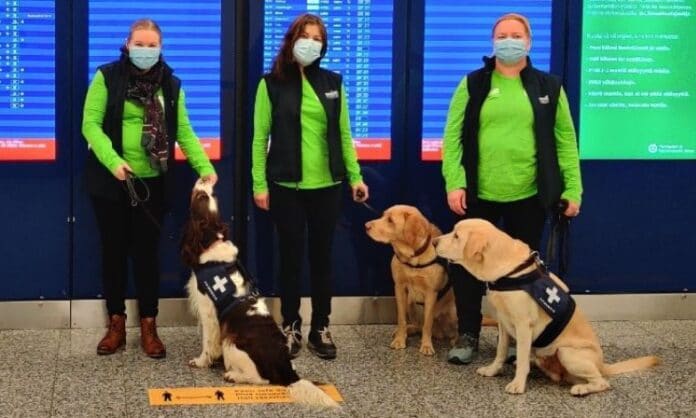Finland’s Helsinki-Vantaa airport has started using detection dogs to sniff out passengers possibly infected with the coronavirus. Dogs are providing a cheap, fast and effective alternative method of testing people for the virus. Around 100 travellers a day and 2200 per month have been queuing up for the test since the booth was set up in September. Testing has shown an accuracy level of nearly 100% even 5 days before actual symptoms appear.
These dogs are part of a pilot scheme project to keep the flying public safe and reduce the spread of COVID-19, alongside other measures. Currently, there are 6 dogs operating at Helsinki- Vantaa airport. The dogs are scheduled to continue screening arriving passengers at least until the end of the year, but according to the project leaders, the project is likely to continue until summer 2021.
Sniffing is cheap, fast and effective
It all started due to the interest to see whether disease-detection dogs could redirect their skills in sniffing out mould, bedbugs and cancer to detecting the new virus as it began to spread in Europe.
“It turned out that training the dogs is a relatively quick process and results were surprisingly good and promising. A dog is capable of detecting the presence of the coronavirus within 10 seconds and the entire process takes less than a minute to complete”, says project manager Soile Turunen of the Wise Nose scent-detection foundation.
The process itself is quite simple. The passenger takes a skin swipe according to the instructions given and drops the sample into the container provided for it. The dog and its trainer are behind a wall, where the dog sniffs the given sample. In this way passengers who are allergic to dogs are taken into consideration, and care is taken that the trainers are not subjected to the coronavirus. Personal information is not collected at the sampling station. If the result is positive, the passenger is directed to the Helsinki University Hospital’s health information station for further instructions. Dogs themselves cannot catch coronavirus since they lack the receptor to which the coronavirus attaches.
The pilot programme is costing approximately 300,000 euros which is significantly lower than for laboratory-based testing methods.
“PCR test cost approximately 4 million euros per month and sniffing less than 100,000 euros” says docent in clinical research of companion animals, Anna Hielm-Bjorkman of Helsinki University.
Meatball, toy or a sausage as a salary raise
 Almost all the dogs have some smell detection background already, with several smells that they recognize and search for.
Almost all the dogs have some smell detection background already, with several smells that they recognize and search for.
“Dogs learn fast to detect the virus but in addition to the smell of coronavirus, they need to be trained to function in the airport environment which might take more time. Usually the training takes 1-3 months all together”, says project manager Turunen
She outlines that not all dogs are suitable for sniffing duties. For example, those who are too old or too young age can be problematic. Also, not all dogs are interested in sniffing in general and they would not be motivated to do it.
“The work shifts proceed in terms of the dogs’ endurance, so we always have two dogs ready to step in while two others are on a work shift. Sometimes a little bonus or salary raise are needed to shake things up and keep the dogs inspired. Bonus can be something like a meatball, a sausage or an interesting new toy”, says Turunen and laughs a little.
“Also, it is very important to allow breaks because nose and brain work are quite demanding after all and we must take care of the wellbeing of these dogs.”
Feedback from arriving passengers has been exceptionally positive.
“The process has been described as easy, painless and completely pleasant”, Turunen proudly states.
Cooperation worldwide
Researchers in countries including Australia, France, Germany and Britain are reportedly working on similar projects but Finland is the first country in Europe to actually enlist dogs to work sniffing out the coronavirus. According to Björkman they are receiving several emails daily from Japan to Dubai with a similar trial taking place at Dubai international airport. At the moment Finland is cooperating with 20-30 countries on research related to covid sniffing dogs.
“It could be a good screening method in other places as well, such as hospitals, care homes and at sporting and cultural events. Dogs could be an important part of managing the pandemic and opening up socities”, say Björkman and Turunen.
They add that there’s a need for a “paradigm shift” for both medical professionals and the public.
“Usually it’s doctors telling patients if they’re sick,” she explained, “but in this case it’s a dog which usually chills bored on a couch. Dogs have so much potential that the world could put to good use even after the pandemic”, says Björkman.




